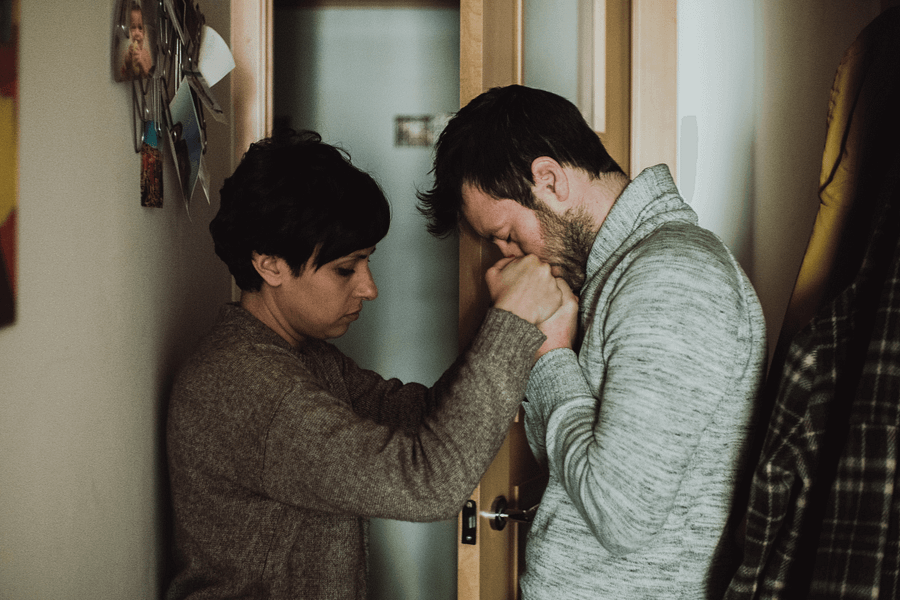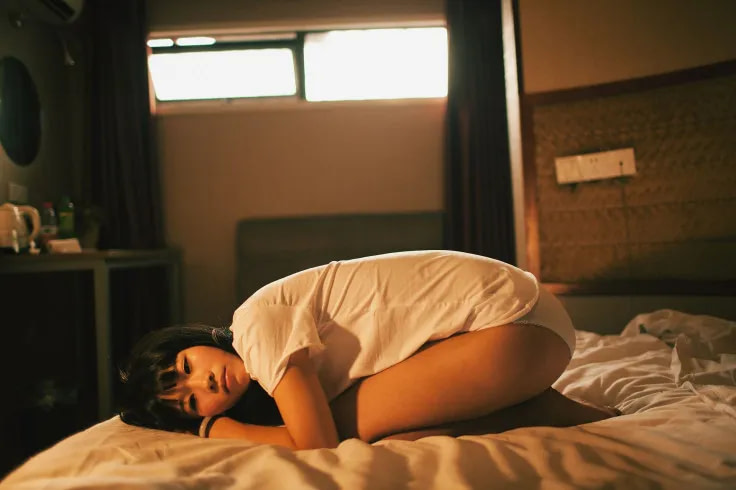Low libido is perfectly normal from time to time, given your life circumstances. Your body is a sex machine and like all machines it needs maintenance to operate. When we slack on that maintenance, either by putting too much on our plates or by rejecting opportunities for emotional connection, our sex drive can break down.
If you aren’t feeling horny anymore but you want to have sex, then let’s explore why and how to get horny again.
10 Reasons Why You Don’t Get Horny Anymore
Your whole life can impact your libido level. From mental health challenges to lifestyle factors, hormonal changes to relationship issues, there are a wide variety of reasons why you’re never horny anymore.
Let’s explore all of the reasons why your sexual desire may be on the floor and how to address them.
1. Too Stressed or Tired
When you’re wiped out from daily hassles or just super tired, sex might be the last thing on your mind. It’s like your body is saying, “Nope, not today.”
- Stress Response: When you’re stressed, your body goes into “fight or flight” mode, releasing adrenaline and cortisol. These hormones are great for short bursts of energy needed in emergencies, but when they’re constantly flowing, they can reduce your interest in activities that are, well, not about surviving the next few minutes. This includes sex.
- Energy Conservation: Think of your body like a smartphone battery. When the charge is low, your phone might go into power-saving mode, shutting down non-essential apps to keep going. Your body does something similar when you’re tired. It conserves energy, and unfortunately, sex is one of the first things it cuts back on.
- Physical Effects of Fatigue: Being overly tired can mess with your nervous system, making it harder for your body to experience sexual arousal or reach orgasm. It’s not just about feeling sleepy; it’s about your body not being able to do its thing.
- Emotional Disconnect: Fatigue and stress can also make you feel less connected to your partner. If you’re mentally and emotionally exhausted, it’s tough to find the emotional bandwidth to share an intimate moment.
Getting enough rest and managing your stress are key to getting your sex drive back on track. Simple things like ensuring you get enough sleep, taking breaks during a busy day, or finding stress-relief techniques that work for you can help reset your body’s reactions and improve your overall mood—and possibly your interest in sex.
2. Relationship Rough Patches

If things aren’t great with your partner, it can definitely affect how you feel sexually. It’s hard to want to get close when you’re feeling distant.
If you feel more like roommates than lovers, here’s what you can do to fix that:
- Talk It Out: Just be real with each other. Sit down and share what’s on your mind like, “Hey, I’ve been feeling kinda distant. Can we figure this out together?” It’s all about being open without pointing fingers.
- Hang Out More: Sometimes you just need to hang out to feel connected again. Plan a regular movie night, start a puzzle together, or just chill and chat about your day. Little moments can lead to big changes in how you feel about each other.
- Get Some Help: If talking between the two of you feels like walking through a minefield, maybe it’s time to bring in a pro. Seeing a couples therapist isn’t about admitting defeat; it’s about leveling up your relationship skills.
- Show Some Love: Don’t underestimate a quick hug, a peck on the cheek, or a sweet text in the middle of the day. These little bits of love can make both of you feel better and closer.
- Try New Stuff Together: Shake things up by doing something fun and different. It could be as simple as trying a new restaurant, or maybe something wild like ziplining. New adventures can make you see each other in a new light and spark up some excitement.
By tackling these relationship snags head-on, you can get back to feeling good around each other, which might just make you want to snuggle up a little closer.
Want more tips? Read my guide to making relationships last.
3. Hormones Out of Whack
Sometimes your body’s hormones just aren’t in sync. Whether it’s your sex hormones like testosterone or estrogen, or even your thyroid acting up, it can really mess with your mojo.
- Testosterone and Estrogen: Yup, both dudes and ladies need these. When they’re out of whack, your desire for sex might nosedive. Guys need to watch their testosterone levels, and ladies, those estrogen levels can be a wild ride, especially during menopause.
- Too Much Thyroid (Hyperthyroidism): Makes you feel all jittery and anxious—definitely not in the mood for love.
- Not Enough Thyroid (Hypothyroidism): Leaves you feeling too tired or down to even think about getting busy.
- Cortisol Overload: Stress has this annoying habit of pumping out cortisol, which basically tells your sex hormones to take a hike. So, when you’re stressed to the max, your sex drive often hits rock bottom.
It’s totally normal for your hormones to go a little haywire every now and then. But if it’s messing with your life or your happiness, it might be time to chat with a doctor. Getting your lifestyle into gear with some good food, exercise, and chill time can really help get those hormones in line.
4. Medication Side Effects
Ever notice how some meds you take for other stuff can throw you off? Things like antidepressants, birth control pills, or even meds for high blood pressure can dial down your sex drive.
Here are a few examples:
- Antidepressants: Medications like SSRIs (think Prozac or Zoloft) are super common for treating depression, but they’re also well-known for putting a damper on libido. It’s like they help calm your mind but sometimes put your sex drive to sleep too.
- Birth Control Pills: Yep, the very thing that lets you have sex without worrying about pregnancy can also make you less interested in it. Some types of birth control pills can lower your body’s testosterone levels, which can reduce your desire.
- Blood Pressure Medications: Beta blockers (like Atenolol or Propranolol) help keep your heart ticking at the right pace, but they might also slow down your sexual energy. They can make it harder to get aroused or maintain that energy.
- Painkillers: Heavy-duty painkillers, especially opioids, are another culprit. They’re great at relieving pain but can also lead to lower libido as a side effect.
It’s a tricky balance, right? If you notice that your meds are messing with your mojo, it’s a good idea to chat with your doctor. They might adjust your dose or try a different med that doesn’t crash your sex drive.
5. Feeling Down

If you’re dealing with depression, anxiety, or just not feeling great about yourself, it can make you feel less interested in sex. Your mind’s gotta feel good for your body to follow.
Here’s why:
- Mental Health Block: When you’re depressed or anxious, your brain’s chemistry can interfere with your sexual desire. Depression often lowers dopamine and serotonin levels, which are crucial for feeling pleasure.
- Emotional Exhaustion: Anxiety and low self-esteem can leave you emotionally drained. When you’re spending so much mental energy on worrying or criticizing yourself, there’s little left for anything else, including intimacy.
- Physical Symptoms: Both depression and anxiety can manifest physically, making you feel lethargic or too tense to engage in sexual activity.
Getting to a better mental space often helps reignite your libido. If these feelings are familiar, talking to a mental health professional can be a big step toward feeling better—and possibly improving your sex drive.
6. Health Issues
Chronic conditions like diabetes or heart issues can put a damper on your sexual desire. It’s tough to get in the mood when you’re not feeling 100%.
Here’s how some common health problems can affect your libido:
- Diabetes: High blood sugar levels can damage nerve fibers throughout the body, including those in the sexual organs. This can lead to problems with getting aroused and having an orgasm. Plus, diabetes can make you really tired and mess with your blood flow, which makes any kind of physical activity a chore, including sex.
- Heart Disease: If your heart isn’t pumping efficiently, it might not pump blood well enough to parts of your body that get you going sexually. Also, if you’re worried that sex will be too much for your heart, then you might want to talk to your doctor.
- Chronic Pain: If you’re dealing with stuff like arthritis or back pain, sex can be more pain than pleasure. And naturally, if it hurts, you’re probably not going to be too excited about it.
- Neurological Disorders: Diseases like multiple sclerosis or Parkinson’s can mess with your nervous system, making it hard for your body to get the signals right for arousal and orgasm.
Getting a handle on these health issues with some help from doctors can do more than just make you healthier—it might also give your sex life a boost. Simple changes in your lifestyle, the right meds, or specific therapies can really help get things back on track.
7. Bad Habits
Smoking, drinking too much, or not moving around enough can all lead to a drop in your sex drive. It’s like these habits are dragging your body down.
Here’s what you can do to turn things around:
- Quit Smoking: Smoking reduces blood flow and affects cardiovascular health, which can dampen sexual performance and desire. Quitting smoking can improve heart health and increase blood flow, enhancing your libido. Many resources are available to help, from nicotine patches to support groups.
- Moderate Alcohol Consumption: While a little alcohol might help you relax, too much can impair your sexual function. Try to stick to moderate drinking — that’s up to one drink per day for women and up to two drinks per day for men, as defined by health guidelines.
- Get Moving: Physical activity boosts endorphins and increases blood circulation, helping enhance your mood and sexual function. Aim for at least 150 minutes of moderate aerobic activity or 75 minutes of vigorous activity each week, as recommended by health authorities. Even daily walks or taking the stairs instead of the elevator can make a difference.
- Eat Healthily: A diet rich in fruits, vegetables, whole grains, and lean proteins can boost your energy levels and improve your health, positively affecting your libido. Foods like watermelon, nuts, and spinach have been linked to improved sexual function.
Making these changes not only improves your general health but can also give your libido a much-needed lift. Plus, you’ll feel better overall, which is a bonus for your sexual wellness.
8. Diet Issues
Eating poorly? Not getting the right nutrients? It can affect more than just your waistline—it can also affect your sex drive.
Junk food might be tasty, but it doesn’t do much for your energy. If you’re always eating stuff that’s high in sugar and bad fats, you’ll crash and burn, leaving you too zapped to get frisky. Your body needs certain nutrients to keep everything running smoothly, including your hormones that control sex drive. For example, zinc and vitamin B are big players in producing testosterone.
Foods high in unhealthy fats can clog up your arteries, and that’s bad news for your heart and other important areas, like your sexual organs. You need good blood flow down there to get things going.
Here’s what you can do to eat better:
- More Fruits and Veggies: They’re packed with vitamins, minerals, and antioxidants, all of which support overall health and help improve circulation.
- Choose Lean Proteins: Foods like chicken, fish, beans, and legumes are great for energy without the bad fats.
- Whole Grains: Swap out white bread and pasta for whole grains like brown rice, quinoa, and whole wheat. They help keep your energy levels steady.
- Stay Hydrated: Drinking plenty of water is crucial. It helps every part of your body work better, including your sexual health.
By switching up what you eat, you can boost your energy, improve your health, and maybe even see a spike in your libido. So, next time you’re about to grab a donut, maybe reach for an apple instead. Your body (and possibly your sex life) will thank you!
9. Getting Older
Getting older means our bodies and hormones go through some changes, which might cool down our interest in sex. For ladies, a drop in estrogen during menopause can make things feel a bit off, and for guys, decreasing testosterone levels might dial down the desire. Plus, if your body’s feeling achier or slower, it could make getting busy less appealing. But it’s not just physical; sometimes, you just feel differently about sex as you age, and that’s totally normal.
So, what can you do about it? Keep active because exercise can boost your mood and energy, making you feel better both inside and out. It’s also super important to talk things out with your partner; being open about what’s changing can help you both find new ways to enjoy being close. If you think hormones are throwing you off, a chat with your doctor might be in order—they can offer advice or treatment options. And don’t forget to mix things up; explore different ways of being intimate that suit your changing body and preferences.
10. Sleep Struggles
Not getting enough shut-eye? Bad sleep can leave you too tired to think about anything else, let alone sex.
When you don’t get enough sleep, your body can’t regulate hormones properly, including those that affect your sex drive, like testosterone. Plus, being tired all the time zaps your energy and mood—both of which you need in good supply for a healthy sex life.
Poor sleep increases stress hormones like cortisol, which can further lower your libido. It’s like a bad cycle where stress ruins your sleep, and bad sleep boosts your stress.
Adults typically need between 7 to 9 hours of sleep per night. But it’s not just about quantity; quality matters too. Here’s how to improve both:
- Stick to a Schedule: Try to go to bed and wake up at the same time every day. Yes, even on weekends. Your body loves routines.
- Create a Restful Environment: Make your bedroom a sleep sanctuary. Keep it cool, quiet, and dark. Invest in a good mattress and pillows if you can.
- Wind Down Before Bed: Give yourself time to relax before bed. Avoid screens for at least an hour before sleep, and try calming activities like reading or taking a warm bath.
- Watch What You Eat and Drink: Avoid large meals, caffeine, and alcohol before bedtime. They can disrupt your sleep cycle.
By getting better sleep, you’re not just helping your body and mind recover from daily stresses—you’re also giving your libido a chance to come back strong. Better sleep leads to better energy, mood, and yes, a better sex life.
Consider the Help of a Sex Coach
Feeling like your sex drive just isn’t what it used to be? You’re definitely not alone, and the good news is, there’s plenty you can do about it. I’m Lanae, and I’ve worked with countless individuals and couples who’ve faced these very challenges. As a sex coach, I’m here to help you explore the underlying reasons why your libido might be lower than you’d like and to discover positive paths forward.

Sometimes, talking things out with someone who gets it can make a world of difference. Together, we can look at aspects of your life that affect your sexual desire—from your relationships and health to your mental well-being and lifestyle choices. I’ll provide you with tailored advice and practical techniques that are designed just for you. Whether it’s learning new ways to communicate with your partner, managing stress more effectively, or exploring therapeutic options, I’m here to support you every step of the way.
Don’t let a low libido define your life or your relationships. Reaching out for help is the first step toward regaining your confidence and rediscovering pleasure. Let’s work together to find solutions that reignite your desire and bring joy back into your intimate life. Book a call with me to get started.
Explore other sexual difficulties on the blog:
- Why Am I Never Horny Anymore? 10 Common Reasons
- How To Increase Female Libido: Tips for Rekindling Passion
- How To Have Better Orgasms That Are Stronger And Longer
- Why Does It Take Me So Long To Cum? Resolving A Delayed Orgasm
- How To Deal With A Porn Addiction

